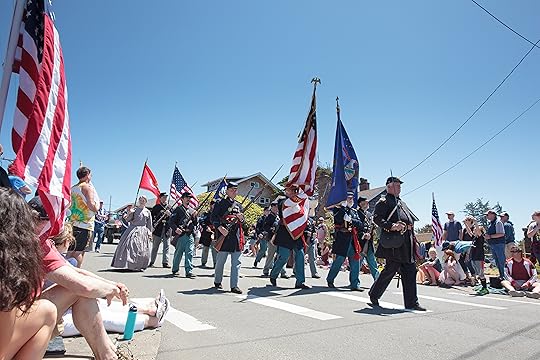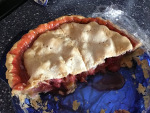Lea Wait's Blog, page 161
July 4, 2019
My Crazy Health Update
So — last year about this time I posted that I’d just been diagnosed with stage 4 pancreatic cancer. Not a fun thing to happen. Especially when my oncologist added that I had 4-6 weeks to live.
Having just survived the death of my husband, though, and being a list maker, I went to work.
All death-related documents (will, medical and financial powers of attorney, etc) updated. I wouldn’t have time to do everything, but I donated all of books and research materials on needlepoint to the Saco Museum, which specializes in needlepoint and samplers of girls in northern New England. I invited the librarian for my local school to visit and take any of the children’s books in my local library that they could use. Same with Wiscasset Public Library, who also were happy to take my librarian’s cart.[image error]
I set aside and marked (or gave, when they came to visit) jewelry and silver and etc. for my children and grandchildren. I called my agent to say the two mysteries I had under contract probably wouldn’t be written. My publishers were understanding. I published two historical novels that had been completed but were sitting in my computer. (CONTRARY WINDS, set in 1777, and FOR FREDOM ALONE, set in 1848 Edinburgh, Scotland.)
All four of my daughters visited — some for the first in years – to “hold my hand while I died.” One of daughters who’d postponed her wedding fifteen years announced she was getting married at the end of August. I suggested she move the date up to make sure I could be there. She did — and I was.
[image error]
Liz in Her Wedding Dress
I’d lost all my hair after 2 chemo treatments, and was feeling weak, but otherwise was fine. Waiting for the severe pain I’d been told would come any day. My readers, many of whom I didn’t know personally, sent prayer shawls and cards and angels, and many prayers and thoughts.
And — I stayed alive.
In October I decided I needed to start doing things other than reading and watching British movies. (Much as I’d enjoyed doing both.) By now my children, all but Liz, who’d found a temporary job in Maine, had left. They had children and jobs to tend to. I started writing again.
November? I attended Crime Bake in Massachusetts, with the help of my fellow Maine [image error]Crime Writers Dick Cass and Bruce Coffin, who drove me back and forth.
December? Three of my daughters announced they were coming for Christmas — which they instructed should be “like the old days.” No writing. Instead, used energy I had to bake cookies and bread, decorated the house with the help of my daughter-in-residence, continued chemo and etc. Rested when I could. Was happy to see everyone for the holidays and meet a son-in-law I’d never met. January 1? Everyone left, even daughter-in-residence. I packed up Christmas decorations, rested, and ended up with a 2-week kidney infection that kept me close to my bed between chemo treatments. I warned agent and editor that the book I was working on wouldn’t be finished February 1.[image error]
March: finished new book (THREAD AND BURIED), did promo for THREAD ON ARRIVAL, which would be published May 1, and published JUSTICE AND MERCY, my first historical mystery. Also had tests that showed my chemo was no longer working. Began another chemo regimen.
April: Side effects from new chemo were not pleasant. Among others – neuropathy worse. I twisted my ankle and – fun! – broke it. My first broken bone. Stubborn, I insisted on going to Malice Domestic in Maryland, one week post-break, complete with heavy cast-boot. Thank goodness for friends [image error]who drove me to and from the airport!
May: Side effects worse. Mouth sores were so bad I couldn’t eat or talk. Somehow I managed to get to Maine Crime Wave on June 1 and spoke on two panels. (Skipped lunch.)
June: Since DEATH AND A POT OF CHOWDER was a finalist for the 2019 Maine Literary Awards along with books by friends Bruce Coffin and Barbara Ross (whose husband drove me) I attended the awards ceremony! (Congrats, Barbara!)
Testing showed the new chemo was not working. My condition was deteriorating. Did I want to stop all chemo and consider hospice? I took a couple of weeks to consider. Then, June 23 — surprise! I had a heart attack. That could be a whole blog, but it won’t be. Bottom line: after a catherization my heart was found to be fine. The anti-coagulants had worked. A good sign?
So earlier this week (July!) I decided to try one more – final – type of chemo. At least this one would have different side effects. And I’d just been moved to a lighter ankle cast. And survived a totally unexpected heart attack. Why not try?[image error]
This week I’m proofing THREAD AND BURIED, the book I wrote last winter. Next week, July 11, I’ll be speaking at a local bookstore. July 27 I’ll be at Books in Boothbay. Writing? I’ve been offered another contract, and have other ideas. Will see how I feel.
In the meantime, I’ve survived a year when given 4-6 weeks. Seems I’m ahead of the game …. and summers in Maine are special.
Now — off to my porch to enjoy the warm weather and proof a manuscript … And thank you to everyone who’s been cheering me on!
July 3, 2019
Yours, Mine, and Ours
[image error]It seems only fitting, since my date this month lands directly on Independence Day, that I get to meander a little bit about the nature of independence. Like almost everyone, I love a parade  and I love even more the local versions that will occur in the smallest towns and hamlets in Maine today, because of what they say to me about our independent natures.
and I love even more the local versions that will occur in the smallest towns and hamlets in Maine today, because of what they say to me about our independent natures.
Like most of us, I was raised with a set of values and prescriptions calculated to support my sense of personal independence: Stand on your own two feet, mind your own business, be true to yourself. All these message combined to give us the sense we could survive on our own, that we are individually strong, and these are important messages, especially for children.
But the fact is that we are bound to and held up by the efforts of many people and institutions: our schools, our churches, our friends, yes, even our governments. [image error]And in most cases, without that support, our individual strengths can waver in the wind.
I believe in balance in the world. Call it karma if you like, but the balance between our individual strengths and our community responsibilities is how we thrive. If we do not care for something outside our individual situations, we have nothing to balance against rampant self-interest. Many of us are struggling, philosophically and practically, against a shift in the prevailing ethic to a grotesque degree of self-interest.
Which was why I was so pleased by the outpouring of support in Portland [image error]for the asylum seekers who’ve recently come into our communities, seeking nothing more than the exact freedom and security our own ancestors sought when they came here. All of us, in that sense, are from away, and if we were to deny these people, we deny our own history.
So a Happy Independence Day to you, your families and to all the people who ever left their homes, voluntarily or not, looking for balance in their lives and independence, personal and communal. Blessings on your heads . .
July 2, 2019
Cloud Gazing
Kate Flora: There has been a lot written lately about the importance of getting out into[image error] nature and the resulting positive effects on our health. Being connected to the natural world was never an issue growing up. We lived on a farm in a small Maine town. We had 140 acres of land. Dealing with the raising of food was a daily event in spring, summer, and fall. From as soon as the pond was warm enough until fall’s chill drove us out, we swam in the pond as often as possible. I grew up with the beauty of sunrise over the orchard and sunset behind the hills across the pond. I didn’t have to make an effort to slow down and see the beauty of the world around me.
Fast forward six decades, and I realize that I have spent a lot of those years sitting at a desk and staring at a screen. It now takes an effort to get up, put down my glasses, and go outside to look at the beautiful world around me. Now that another big birthday looms, I am making myself get up. Go outside. Look around. And I am ridiculously lucky that I am surrounded by lovely gardens at one house and have ocean views and sunsets at my Maine cottage.
[image error]The notion that we should always be “doing” is a deep-rooted New England one. The devil finds work for idle hands and all that. I don’t know about you, but I have to shove that aside to allow myself to enjoy not doing. Especially since I have promised a book at the end of the summer and I’m not very far along. So this summer, I am trying to balance the thousand words a day and the reading I have to do, with gardening–including admiring how delicate and lovely each flower is–and breathing in the world around me.
I can feel awfully old-fashion sometimes, when what I enjoy is my work, my gardening, and cooking. Isn’t it time to cast those comparisons to others aside? To simply love it when a character seizes a scene and takes off? To be content when hours of work result in a patch in the garden that is suddenly harmonious and interesting? To be pleased to bring a strawberry-rhubarb pie to the table made with my own rhubarb.
Maybe I’ll never be Michelle Pfeiffer curled up on the piano singing in The Fabulous


Baker Boys, or the brilliant painter my friend Pete was, or the exquisite baker my friend Carol is. My desk will never be neat. Neither will my gardens. But that’s okay. I am writing to the trilling of birds at daybreak and watching storm clouds and sunsets and practicing something new: contentment.


Next time you see me, ask how that’s going.
Now–here are some clouds for you.



June 30, 2019
Milestones
[image error]Kaitlyn Dunnett/Kathy Lynn Emerson here, reflecting on milestones, those markers in our lives, writing or otherwise, that are for some reason memorable and worth noting. I hit one of the professional biggies on June 25 of this year with the publication of Clause & Effect. It’s the second book in the “Deadly Edits” series and the fourteenth of my novels Kensington Books has published—twentieth if you count the paperback reprints of the first six Face Down novels. It’s my thirty-third published mystery novel if I include the two written for ages 8-12 and don’t count the novels categorized as romantic suspense. Most significant, though, is that it is my sixtieth traditionally published book.
[image error]
My first published book (1984), now updated and expanded into my Tudor Women website
When people remark on this, I tend to downplay the accomplishment. After all, there are plenty of writers out there with well over a hundred books to their credit. Then, too, there’s the fact that my writing career dates back to 1976. My first book, a work of nonfiction, was published in 1984. If you divide the thirty-five years since by those sixty books, my accomplishment doesn’t seem nearly as impressive. I get points for longevity, and for stubbornly sticking with this career even when nothing was selling, but so do many other writers.
[image error]
first mystery (for ages 8-12)
That said, I’m going to indulge myself on this occasion and do a bit of bragging, because I am proud of the fact that every one of those sixty books was published by a traditional publisher. I have nothing against writers who decide to publish their own work, especially those who have a prior track record with traditionally published books, but I can’t help but feel a sense of accomplishment that my writing has managed to convince numerous professional editors and, more important, their marketing departments, to take a chance on me over the years.
[image error]
first historical mystery
An aside here, for readers who may be wondering what the distinction is. A book that is traditionally published is one that was sold by the author to a publisher. The publisher pays the author for the right to publish the book in print format and may or may not also acquire “rights” to other formats such as e-book, audiobook, and large print. The key here is that the publisher pays the author. This usually involves an advance against royalties. It definitely involves the author receiving royalties—a percentage of the price of the published book. The publisher provides editing, cover art, marketing, and other services as part of the deal. The author provides the manuscript. Indie books are published by the author at the author’s expense and the author does for herself everything normally done by a traditional publisher. If she’s smart, she hires professionals to handle the editing, the cover art, and so on. She receives all the income from the published book, but does a lot more work and spends a lot more money to get to that point. It’s not easy to have a book accepted by a traditional publisher, but once it is, it’s a lot less work for the writer. All the profits flow in, not out, with the exception of the expense of any self-promotion the author chooses to do.
[image error]
first mystery written as Kaitlyn Dunnett
Call it sheer laziness, but I’ve always preferred the traditional route. So far it’s been working for me. Two more cozy mysteries are already written and scheduled for publication with Kensington. My current “Deadly Edits” contract calls for me to write one more, to be turned in next year. I also have other projects in the works.
The next milestone, sixty-five traditionally published books, is within the realm of possibility. I doubt I’ll hit a hundred, but you never know. There was a time when I thought I’d be doing well if I had a total of ten books published during my writing career.
If anyone is interested, there is a complete list of my books, including the young adult novel I self-published some years ago as an e-book original, at http://www.kathylynnemerson.com/booklist.htm.
[image error]
With the June 2019 publication of Clause & Effect, Kathy Lynn Emerson/Kaitlyn Dunnett will have had sixty books traditionally published. She won the Agatha Award and was an Anthony and Macavity finalist for best mystery nonfiction of 2008 for How to Write Killer Historical Mysteries and was an Agatha Award finalist in 2015 in the best mystery short story category. She was the Malice Domestic Guest of Honor in 2014. Currently she writes the contemporary Liss MacCrimmon Mysteries and the “Deadly Edits” series as Kaitlyn. As Kathy, her most recent book is a collection of short stories, Different Times, Different Crimes. Her websites are www.KaitlynDunnett.com and www.KathyLynnEmerson.com and she maintains a website about women who lived in England between 1485 and 1603 at A Who’s Who of Tudor Women.
June 28, 2019
Weekend Update: June 29-30, 2019
[image error]Next week at Maine Crime Writers, there will be posts by Kaitlyn Dunnett/Kathy Lynn Emerson (Monday), Kate Flora (Tuesday), Dick Cass (Thursday) and Lea Wait (Friday).
In the news department, here’s what’s happening with some of us who blog regularly at Maine Crime Writers:
from Kaitlyn Dunnett:
[image error] Clause & Effect is in stores now! It’s currently available as a hardcover, an ebook and an audiobook. The trade paperback edition will be out in June of 2020. This is the second in my “Deadly Edits” series featuring retired schoolteacher turned freelance editor (aka book doctor) as the amateur detective.
An invitation to readers of this blog: Do you have news relating to Maine, Crime, or Writing? We’d love to hear from you. Just comment below to share.
And a reminder: If your library, school, or organization is looking for a speaker, we are often available to talk about the writing process, research, where we get our ideas, and other mysteries of the business. Contact Kate Flora
What Draws You In, Character or Plot?
Today, we’re discussing a question posed by one of our readers. She asked which did we think drew readers into a book–the plot, or the characters. Here are some of our thoughts on the subject.
[image error]
Bruce Robert Coffin: Great question! I have always felt the need for a one to one mix of those two ingredients. A great plot will always intrigue me, but characters I care about tend to keep me coming back for more, muy importante if one is seeking a sustainable series.
Lea Wait: I agree with Bruce: both are important. (Setting, and it’s influence on both plot and character, is also very important.) But I also believe the degree of importance of each element depends on the book itself. For a stand-alone, plot is essential. Suspense? Absolutely. Readers need to anticipate — or at minimum be curious about — what will come next. Characters? Victims and sleuths might even be interchangeable. That enhances the suspense. But in a series … characters are critical (and note the plural of character.) Readers want to like the major character enough to return to his or her world again. And again. Plots can vary widely … but characters are critical to a series.
Susan Vaughan: Bruce and Lea have made great points. I agree that characters and characterization are key. I’ll approach this from a different angle, from the reader’s perspective. When I was a new writer, I was caught up in my plots as much as my characters. So when a potential reader asked me what my book was about, I launched into an “elevator pitch,” that is, a brief summary of the plot premise. Quickly eyes glazed over and I could tell I wasn’t luring in that reader. So I’ve learned that when that question is asked, my “elevator pitch” covers the characters, only touching on the danger they’re thrown into. I also want to add that when I told my newsletter subscribers about the new book, Hidden Obsession, coming out later this summer, the sequel to Primal Obsession, a few of them contacted me to ask if Sam and Annie from that book would also appear. So readers remember characters, even from a standalone, and want to see them again.
Kate Flora: I think this is answered, in part, by Susan’s comment, above–readers want to know if our characters will reappear. Another way to test the importance of character since I am a character-drive author, is to ask the question: how would the plot, or the way the story evolves, be different if the protagonist weren’t Joe Burgess or Thea Kozak. For such much of the books, the road to solving the mystery derives from our central character’s questions, and often the roadblocks arise from our character’s flaws, dark places, or fears, which create obstacles to solving the mystery. I know that my readers have developed a deep affection for Thea and Andre, and for Joe and the challenges he faces in his personal life as he moves from his monkish existence to a man with a family. All that being said, obviously a book without a complex plot to drive the story wouldn’t be a mystery that compels readers to keep turning the pages.
Obviously, as Lea notes, setting is also important. We all know that readers love books set in Maine because Maine has a particular mystique in our reader’s imaginations.
Kaitlyn Dunnett/Kathy Lynn Emerson: What’s already been said pretty much covers the question. Plot, characters, and setting, too, are all pretty darned crucial to a successful novel, regardless of genre or sub-genre. So, I’ll add a twist. When I’m starting a new series (or writing a stand-alone novel), it’s definitely the characters that I think about first. Plot comes much later. In fact, it usually runs a poor third behind planning the setting. In planning a new mystery novel and contemplating the crime, usually a murder, I’m thinking in terms of who gets killed, who will solve the crime, who will help in that endeavor, who will be suspected, and who dunnit. The details of the plot flow from those decisions. Sometimes they’re even subject to change as the individual characters develop during the writing process. I suspect readers are drawn into the “story” in the same way. If the characters are interesting enough, they’ll commit to following the twist and turns of the plot. If the characters are bland and uninteresting, no one’s going to care what happens to them.
Maureen Milliken: Character, every time. I don’t want to read a book if I don’t care about, or am interested in, the characters. Plot is necessary, yes, but it’s characters that make a book. When readers tell me what they like about my books, a lot of it has to do with character. When I was 14, I read my first Dorothy Sayers book, and was blown away — it was the first time I realized a mystery novel could be as much about how people felt, what they were doing and how they interacted with each other as about plot. I love Stephen King because he captures the marginalized and misfit so well. His stories wouldn’t be nearly as good if he didn’t have such a firm grasp on character.
Still not convinced? As I’m sure some of my colleagues have already pointed out, it’s character that drives plot. How people behave and react, what they do and why. Can’t have a good book without good characters.
Barb: Both are necessary. Readers need to care enough about the characters to care what happens to them–and something has to happen to them. Otherwise, why are you telling this particular story?
Sandy Neily: I thought I’d share some of the reminders I have up on my wall (to look at when I write).
Bring the PAIN Early. (I think that means bring it to characters through the plot. Then both the protagonist and the antagonist (or villain) have motives to do what they do. They have motives to change behaviors and often the pain drives these plot changes.
All Plot Comes From Desire and Want (Each page should have something someone wants. That want, even a glass of water, sets off a chain of events.)
“Character, Character, Character” (What matters most to readers said Lily King in her workshop that I attended. This from an author who opens her amazing novel Euphoria with a primitive tribe throwing a dead baby into the waters as white folks approach, so she’s no slouch on plot either. What each person brings with her/him as tools to deal with or not deal with this world … is the meat of the book.)
[image error]
Charlotte the spider spins the web of plot around her in amazing ways.
And from Helen Keller, who of course should really know: “Character cannot be developed in ease and quiet. Only through experience of trial and suffering can the soul be strengthened, ambition inspired, and success achieved.”
June 26, 2019
Ten of Maggie Summer’s Secrets
Maggie Summer is the protagonist in my eight book Shadows Antique Print Mystery series. (Shadows at the Fair, Shadows on the Coast of Maine, Shadows on the Ivy, [image error]Shadows at the Spring Show, Shadows of a Down East Summer, Shadows on a Cape Cod Wedding, Shadows on a Maine Christmas, and Shadows on a Morning in Maine.)
Recently I was on a writing panel and one of the pieces of advice I shared was that every character in a book — yes, even the minor characters – should have a secret. Maybe many secrets. And, no, they don’t have to be revealed in the book. (Or books, if it’s a series.) But the author should know what those secrets are, because their secrets can influence a character to do one thing . . . or another.[image error]
After all — we all have secrets, big or small. And, no, I’m not going to tell you mine. (Maybe another time. Or maybe I’ll give one of mine to one of my characters . . . ) If you’re in doubt, think for a moment. Have you (or your character) every shoplifted? Lied to a parent, a spouse . . . or a policeman? Had too much to drink and told someone off? Used illegal drugs? Used prescribed drugs when they weren’t prescribed? Cheated on a test? Slept with someone who was “off-limits”? Pretended to be someone you weren’t? Exaggerated (or totally invented) an accomplishment? Been arrested? Lied to protect someone else? Lied about your age? Called in sick when you were feeling fine? Turned down an opportunity because you were afraid of something?
OK – some of those things are clearly more serious than others. Often the seriousness would depend on the circumstances . . . and consequences.
But none of us are perfect.
So . . . although I won’t tell you my secrets . . . here are ten of Maggie’s.
1. She knew her husband was cheating on her long before she found the evidence.
2. She drinks Diet Pepsi, but she keeps a secret supply of chocolate in that red canvas bag she carries, and sometimes she eats it all.
3. She hasn’t heard from her brother in over ten years – and she’s glad. She’s afraid of him.
4. She wants to be a mother because she’s sure she can be a better mother than HER mother was.
5. She’s afraid to be dependent on any man, because she doesn’t trust men not to leave.
6. One reason she wants to adopt is that a high school friend of hers was forced (by her parents) to give her baby up for adoption. And Maggie was jealous of her friend’s pregnancy.
7. She doesn’t drink much wine because she’s afraid of losing control.
8. She’s an intellectual snob. She judges people by the books they read.
9. She’s allergic to perfume.
10. She thinks her legs are ugly, so she wears slacks instead of dresses.
Will any of these secrets influence her life? Read the Shadows Antique Print Mystery series . . . and you may find out!
As I Remember It
Dorothy Cannell: My husband, Julian, and I are going to England in August. The first part of our trip will be spent at the mystery college at St. Hilda’s College in Oxford. This will be our second time at this event and as we get closer in time, and my mind is filled with happy possibilities, I also find myself thinking back to the England of my growing up years and what I most treasure in memory:
The bluebell woods in spring, the sound of the cuckoo in the early morning. Reciting the [image error]words – The cuckoo comes to England in April and flies away in June. Wallflowers. Such ordinary flowers with a heavenly scent. Holding a buttercup under someone’s chin, and if there was a golden glow saying “you like butter.” Standing at the edge of a pond catching tidlers in a net.
Long winter evenings with the curtains drawn snugly against wind or rain, with the coal fire crisply red and casting warm silhouettes upon the papered walls. We didn’t think of the harm to our lungs in those days, the only negative was the chilblains on our toes from putting cold feet to the heat.
Summer with its long days and nights, watching cricket played on the green. Strawberries picked from my paternal grandfather’s allotment (a piece of land for growing vegetables, etc.) and eaten soon after dipped in sugar. He had a shed on the allotment where he kept a tin of ginger biscuits. I remember they were always rather soft, but it seemed right they should be that way. Some years we went on a week’s summer holiday to the seaside, but more often we took day trips by coach (long distance buses). Either way the most glorious moment was the first smell of the sea. We lived in Kent so we usually went to Folkston, Hastings or Margate. The latter was working class then, but I’ve learned that it and its neighbor Ramsgate have gone up market because so many people want second homes on the coast.
Going on a bus ride to the nearest town. Best of all one that had a market day, with part [image error]of the road given over to stalls that sold everything from linens, fabric, china and glass, brass and copper, to dogs, cats and rabbits. My school friend had a dog she’d ‘got off the market’, but my mother said they always had worms. Just being on the bus was lovely. I always liked catching bits of conversation. I remember a woman talking to the one sitting next to her. She was going to spend the day with her daughter-in-law. She always did this on a Wednesday. It stayed with me because it sounded so cozy and settled.
Trains were the great thrill. We didn’t have a car. We had aunts and uncles with them, but I never thought that having one would be nice. When our mother took us up to London, something that happened perhaps four or five times year, it was always an enormous treat especially because we went to John Lewis, the department store in Oxford Street, where my father worked in the woolen materials department. We loved to creep up on him when he was serving a customer and see the ‘surprise’ on his face. England will always be for me my parents, my father with his love of books and the garden, and my mother with her wonderful gift for anecdote and laughter. Coming up out of the underground was magic because of the steep escalators leading to the main line station. When I was little I called them the golden moving staircases because the treads were made of brass.
Close by my Grandfather’s allotment was the graveyard where his wife, my grandmother, was buried along with their oldest son who had died in a work accident when he was twenty. My father took me there once when we were out cycling. Just me and him. We leant our bikes against the iron railing and walked between the tombstones until we came to the one with the familiar names on it. I knew from my mother that my father had been devastated by his brother Gilbert’s death. They’d been only elven months apart in age. “He can’t talk about it,” she had said, “it goes too deep.” We stood without saying anything for several minutes and returned to our bikes without breaking the silence. I remember it as a sacred occasion. I sensed that my father didn’t want me to speak, just to be there while he remembered. Our older son’s middle name is Gilbert.
Remembering those days is at the core of who I am. I have now lived in America far longer than I lived in England and I love this country. But England gave me what I believe I was meant to be. It frames my writing life, which is my inner world. So, I will go to Oxford and then on to Lincoln where I have family and paint new memories.
Happy reading.
Dorothy
June 24, 2019
Kingsolver on the Power of Fiction
In my last post I drew on the wisdom and experience of E. B. White who wrote from his Brooklin, Maine home about his love of farm implements and animals, seasons, weather, and wordsmithing. Another celebrated writer, this time living, is the inspiration for today’s piece.
[image error]Barbara Kingsolver—author of the Pulitzer-nominated The Poisonwood Bible—has made it her mission to speak and write about the craft of creating fiction. Carrying out her task, she is direct, absolutely clear, inspiring. And, to be honest, some of what she says scares the bejesus out of me.
Literature, Kingsolver tells us, is a craft so extraordinarily powerful we are obliged to take it seriously. It’s a weighty calling.
Kingsolver likens the act of writing a book to walking into a cathedral. Recalling a visit to Saint Patrick’s in Manhattan, I understood her meaning. You leave behind the noise and distraction of Madison Avenue and step into the hushed domain of time and stunning craft. The Gothic cathedral was built by generations of exceptionally skilled artisans following inspired designs of men who dreamed up the whole damn thing, and you just can’t believe it.
Kingsolver uses the word “humility” when she likens cathedral making to penning a piece of fiction. Both demand humility because, she says, “the body of all written words already in print is vaulted and vast. You think you have something new to add to that? If so, it can only come from a position of respect: for the form, the process, and eventually for a reader’s valuable attention.”
In my view, respect for the reader translates into creating something that matters. As Kingsolver puts it, that something creates empathy and impacts readers politically. In her case the understory in The Bean Trees is parental rights of Native Americans and in The Poisonwood Bible Congo’s it’s the bloody history of political struggle.
A lover of the natural world and ecologist by training, it’s no surprise that Kingsolver took on the most compelling global crisis of our day—climate change. This crisis is “really, really terrible, let’s face it,” she says. “And it’s not going to end well.” [image error]
Kingsolver’s climate-fiction book Flight Behavior is both momentous and intimate, which is precisely why it works so beautifully. She transforms what is literally whole earth catastrophe into something personal through Dellarobia Turnbow, a restless Tennessee farmwife whose husband Cub “does everything in first gear”.
Very early in the story Dellarobia’s life is instantly changed by a magical other-worldly sight—15 million monarch butterflies that suddenly roost on the Turnbow property. As she later learns from a biologist investigating the phenomenon, climate change underlies the monarch’s sudden appearance. Budding ecologist Dellarobia faces a personal crisis when Cub’s father says he will clear-cut the butterfly roosting site to pay off an impending debt.
Based on Kingsolver’s own criteria, Flight Behavior has been generally well received. “Urgent issues demand important art. (This book) rises – with conscience and majesty—to the occasion of its time”, The Guardian said. Kirkus Review calls it “one of Kingsolver’s better efforts at preaching her politics and pulling heartstrings at the same time.” “Global warming and intimations of doomsday … share these pages with smaller-scale, deliciously human moments” says the New York Times.
Inspired by Barbara Kingsolver, here is today’s take-away for fiction writers: 1) the craft can be extraordinarily powerful—never forget this, 2) revere the form, process, and principally the reader, and 3) cultivate humility.
More living (and writing) in the great state of Maine
As regular readers know, I’ve been thundering around Maine in the Subaru, and posting some of the photos from my travels here.
Someone who is a regular visitor to Maine’s coast from out of state (I guess not a regular reader) recently wondered to me if there was “anything interesting” in inland Maine.
There is.
Here’s some of it from my travels just in the last three days.
[image error]
Visited Swan Island — the one in the Kennebec River, not off the coast — which is a preserve of the state Department of Inland Fisheries and Wildlife. It used to be a town, and some of the houses are still there, including this one, built in 1787.
[image error]
Was driving on U.S. Route 201 just north of Skowhegan, and saw a sign for “Robbins Hill Scenic Area.” I checked it out, and it was.
[image error]
I’m a sucker for anything to do with Benedict Arnold’s ill-fated march to Quebec City. There are historical markers all up and down the Kennebec River, as well as in Frankllin County. This one is particularly poignant, where they had to cross the Kennebec then portage their 400-pound bateaux and supplies up and down steep cliffs. Route 201 just north of West Forks.
[image error]
Another scenic view, this one just south of Jackman. Attean Lake is named after Joseph Attean, the first elected chief of the Penobscots, and also Henry Thoreaus guide on one of his trips to Maine. Attean died on a Penobscot River log drive attempting to save his crew as the boat broke up on rapids.
There’s a lot more, just from the last three or four days, but this is a sampling. Except for Swan Island, none of this was an intentional trip. These are just the types of things you come across as you travel around Maine.
I strongly suggest to everyone that this summer you grab your Maine Atlas & Gazzetteer (GPS isn’t always reliable) and hit the Maine roads. When a sign says “scenic view,” stop and check it out. When there’s a historical marker, check that out, too. Stop in if the historical society or museum you pass is open. You’ll be thrilled and amazed at what you may find.
Lea Wait's Blog
- Lea Wait's profile
- 506 followers



